-
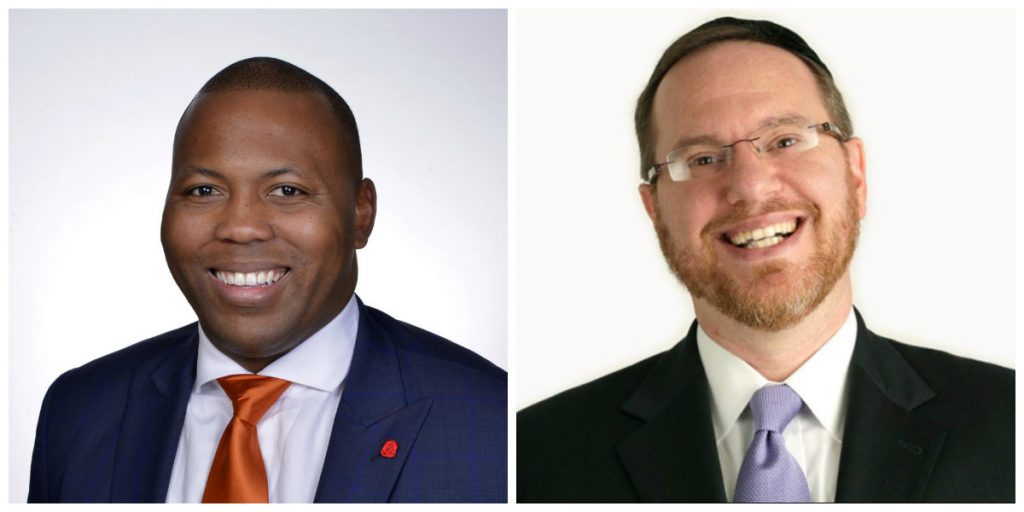 New State Reps. Kam Buckner (D-Chicago) and Rabbi Mark Kalish (D-Chicago) were appointed and sworn in over the weekend.
New State Reps. Kam Buckner (D-Chicago) and Rabbi Mark Kalish (D-Chicago) were appointed and sworn in over the weekend.
The Illinois House has two new members as of this weekend who were appointed to replace former House members Christian Mitchell (D-Chicago), who is now serving in Gov. JB Pritzker’s administration, and Lou Lang (D-Skokie), who left the General Assembly earlier this month to join statehouse veteran Nancy Kimme’s lobbying firm. -
One of Gov. JB Pritzker’s first official actions in office last week — the announcement that AFSCME Council 31 members would soon be put back on the appropriate “pay steps” that had been frozen since the summer of 2015 — was designed to send a deliberate message to the public employee unions that had so often come under attack during former Gov. Bruce Rauner’s four years in office.
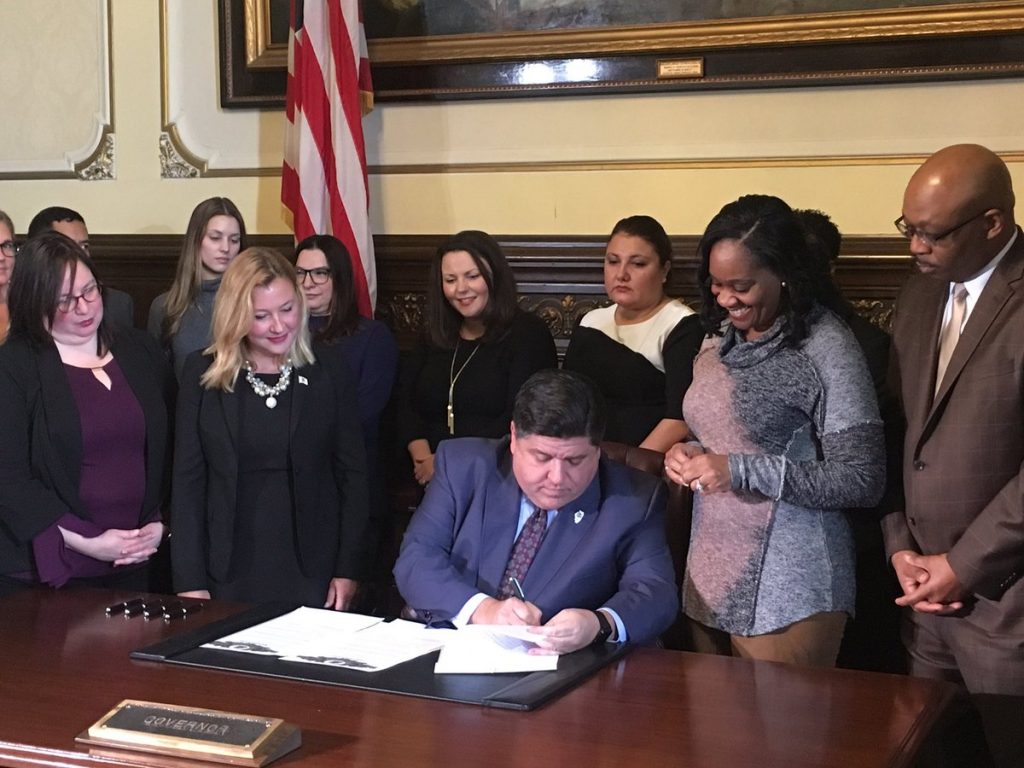 Gov. JB Pritzker signs two executive orders and a bill related to labor on his first day in office. [Hannah Meisel/The Daily Line]
Gov. JB Pritzker signs two executive orders and a bill related to labor on his first day in office. [Hannah Meisel/The Daily Line]
-
Freshly inaugurated Gov. JB Pritzker is set to sign yet another executive order on Friday — his fourth of the week — after signing the Gun Dealer Licensing Act in Chicago on Thursday.
-
The replacement for newly minted Deputy Gov. Christian Mitchell, elected in 2013, will be chosen Friday afternoon, completing the trio of new leaders for the Hyde Park area.
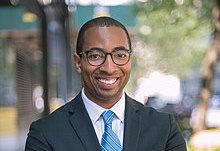 Christian Mitchell
Christian Mitchell
-
The Illinois Supreme Court this week returned to Springfield for its January oral argument session, which includes major cases on de facto life sentences for teenage offenders, a Chicago ordinance on food trucks and whether regulating stun guns and tasers under Illinois’ concealed carry law violates the Second Amendment.
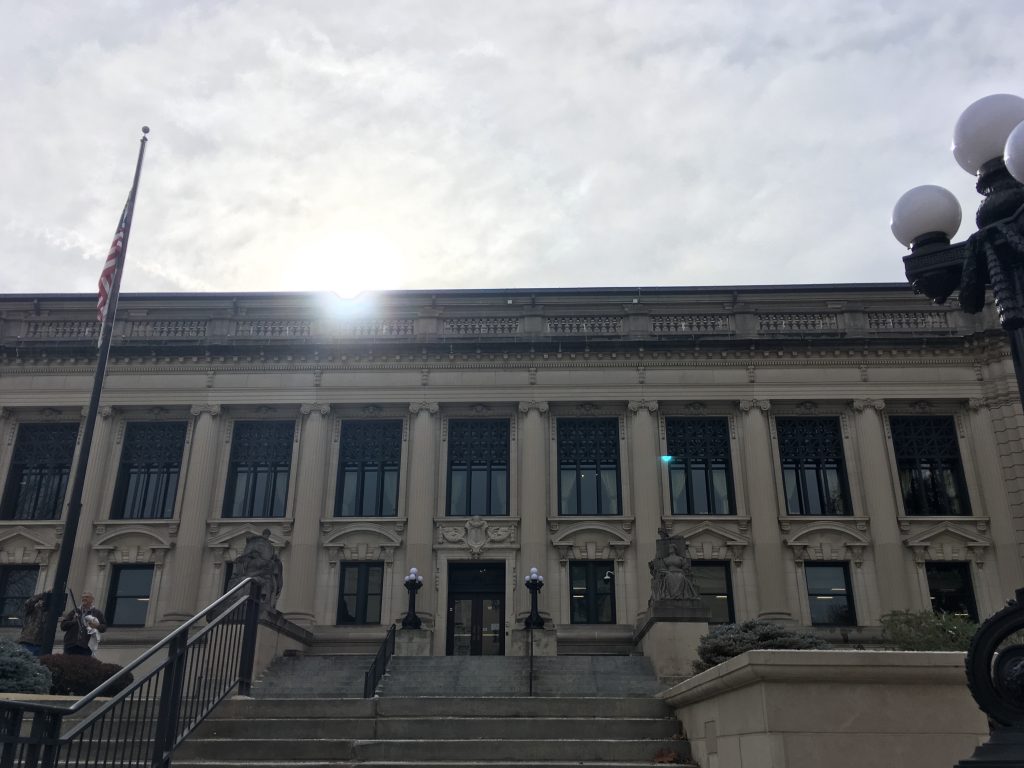 The Illinois Supreme Court building in Springfield on Nov. 29, 2018. [Hannah Meisel/The Daily Line]
The Illinois Supreme Court building in Springfield on Nov. 29, 2018. [Hannah Meisel/The Daily Line]
-
With Gov. JB Pritzker swept into office by a political tidal wave carried along by shifting alliances and a changing electorate, Illinois Democrats will have a chance to implement policies that have been at the top of wish lists for progressive Democrats across the nation.The standing-room-only crowd at the Bank of Springfield Center cheered Pritzker and the other constitutional officers as they each in turn laid out their visions for Illinois, and got in little digs at the previous four years under former Gov. Bruce Rauner.
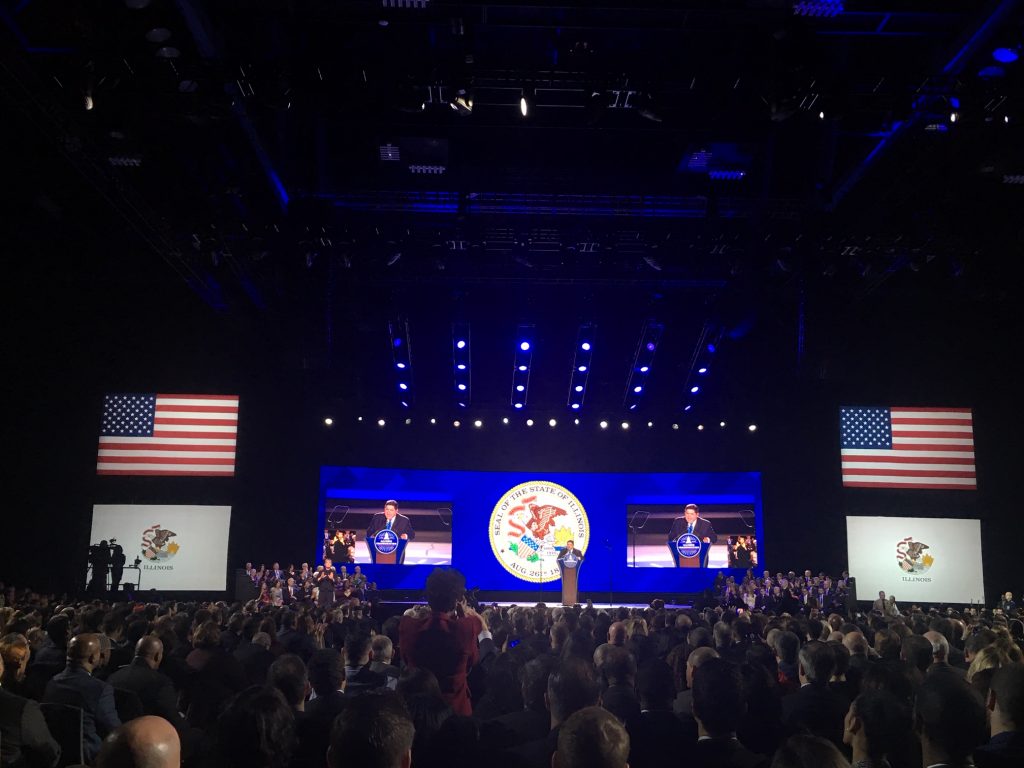 “I won’t hollow out the functions of government to achieve an ideological agenda — I won’t make government the enemy and government employees the scapegoats. Responsible fiscal management is a marriage of numbers — and values.” [Hannah Meisel/The Daily Line]
“I won’t hollow out the functions of government to achieve an ideological agenda — I won’t make government the enemy and government employees the scapegoats. Responsible fiscal management is a marriage of numbers — and values.” [Hannah Meisel/The Daily Line]
After beginning his inaugural address with an anecdote about a church that rose from the ashes of the Great Chicago Fire, Pritzker said Illinois faces a similar challenge.
Pritzker quoted the Rev. Robert Collyer, pastor of the Second Unitarian Church in Chicago, who reassured his parishioners that though their homes and businesses had been consumed the fire, the city had not lost its heart, or its hope, Pritzker said
“The fire makes no difference to me,” Pritzker quoted Collyer as having said. “If you'll stay here, I will. And we'll work together, and help each other out of our troubles.”The story could’ve been a subtle nod to Illinois’ out-migration issue, which Comptroller Susana Mendoza, who is also running for mayor of Chicago, also mentioned, referring to Illinois as “the greatest state.”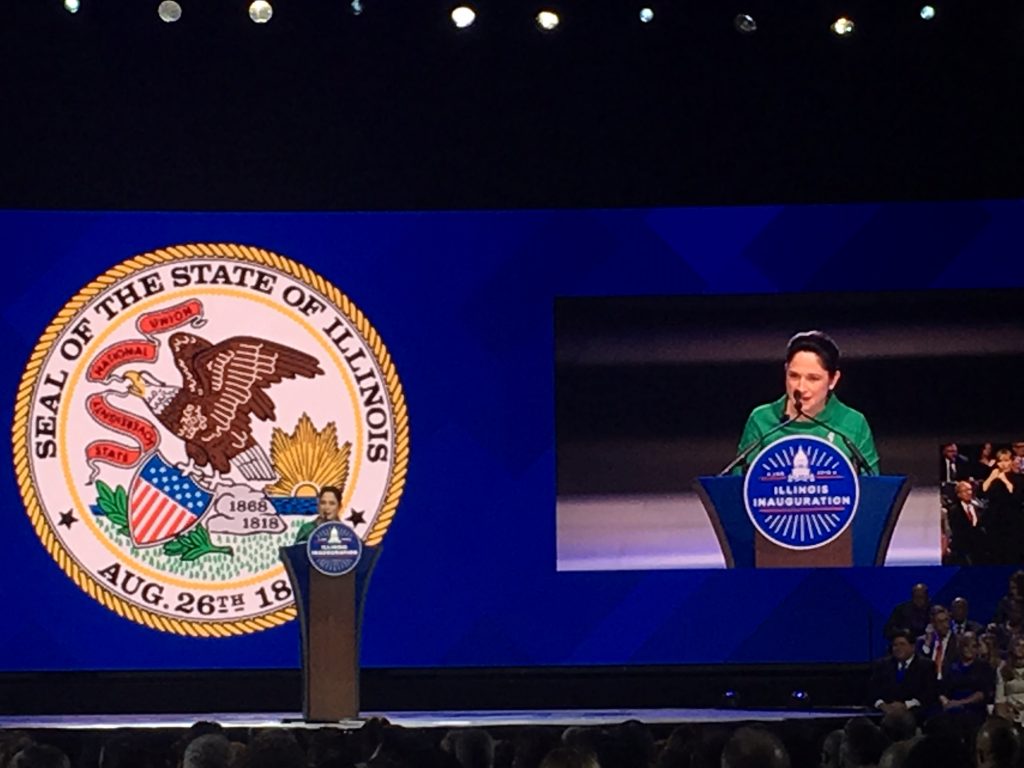 Comptroller Susana Mendoza proclaimed her love of the Prairie State. [Hannah Meisel/The Daily Line]
Comptroller Susana Mendoza proclaimed her love of the Prairie State. [Hannah Meisel/The Daily Line]
“Don’t even think about moving anywhere else,” Mendoza joked. “This is where you want to be. This is it. The weather only weeds out the people who don’t deserve to live here.”
Newly minted Attorney General Kwame Raoul told the crowd that “some criticisms of state government are legitimate,” but said his overall priority will be continuing the fight back against “federal attacks on our values” — a reference to President Donald Trump, a battle that former Attorney General Lisa Madigan launched.
Pritzker acknowledged the need for Illinois’ government to be more efficient, and echoed one of Rauner's promises by vowing to bring Illinois’ information technology systems up to date. But Pritzker did not hesitate to listwhat he and other Democrats consider failures of the Rauner era, as the former governor sat on stage.
“Inexpensive healthcare prevention programs were decimated, causing higher spending to treat diseases that could have been cured,” Pritzker said. “Balancing the budget means lowering the cost of government while delivering the high quality services Illinoisans deserve.”
The governor also received major applause from a line that both promised progressive ideals and blasted the Rauner administration.
“But be clear about this: I won’t balance the budget on the backs of the starving, the sick, and the suffering,” Pritzker said. “I won’t hollow out the functions of government to achieve an ideological agenda — I won’t make government the enemy and government employees the scapegoats. Responsible fiscal management is a marriage of numbers — and values.”
The governor’s most forceful lines came when promising a fight against those who would get in the way of his goal of implementing a graduated income tax.
“Our regressive tax system, including property taxes and sales taxes, currently has the middle class paying more than double the rate the wealthy pay,” Pritzker said. “That’s not fair, and it also doesn’t pay our bills.”
Pritzker vowed to work for equal rights for women, minorities and LGBT citizens, and promised to tackle climate change, telling the crowd: “I believe in science.”
“To that end, as one of my first acts as governor, Illinois will become a member of the U.S. Climate Alliance, upholding the goals and ideals of the Paris Climate Accord,” he said, prompting sustained applause.
Both Pritzker and Raoul listed fighting gun violence as top priorities of their terms, with Raoul noting that there had been a shooting on his block in Hyde Park just last week.
Though the General Assembly passed two gun bills Rauner signed last year, sponsors of a bill to license gun dealers in Illinois held off sending that bill to Rauner, who had already vetoed it once before, and the bill will land instead on Pritzker’s desk early in his term.
The governor also gave a nod to organized labor, which endorsed him early on in the race. Rauner had protracted fights with public employee unions, most notable AFSCME Council 31, which contributed to Illinois’ 736-day budget impasse.
Related: Pritzker set to end two AFSCME lawsuits that defined Rauner term
“Working men and women deserve to have a governor and a Department of Labor that will enforce laws protecting workers’ wages and workers’ rights,” Pritzker said. “And they deserve a $15 minimum wage. It’s good for the working families of Illinois and good for our economy.”
The governor also promised to make good on his promise to legalize — and tax — recreational marijuana, a proposal popular with voters, but one that could take years to be implemented to address those incarcerated for marijuana-related crimes.
Pritzker had frequently begun campaign speeches with a line telling supporters that “everything we believe in is under attack” by Trump and Rauner.
But now that one half of that Republican duo has moved out of the governor’s mansion in Springfield, and the $270 million campaign is over, Pritzker will face a lengthy to-do list on his new desk Tuesday morning.
But first, Pritzker danced to "How Sweet It Is" by James Taylor with his wife, MK, and then treated the crowd to concert by Maroon 5 — who will play the Super Bowl in a few weeks.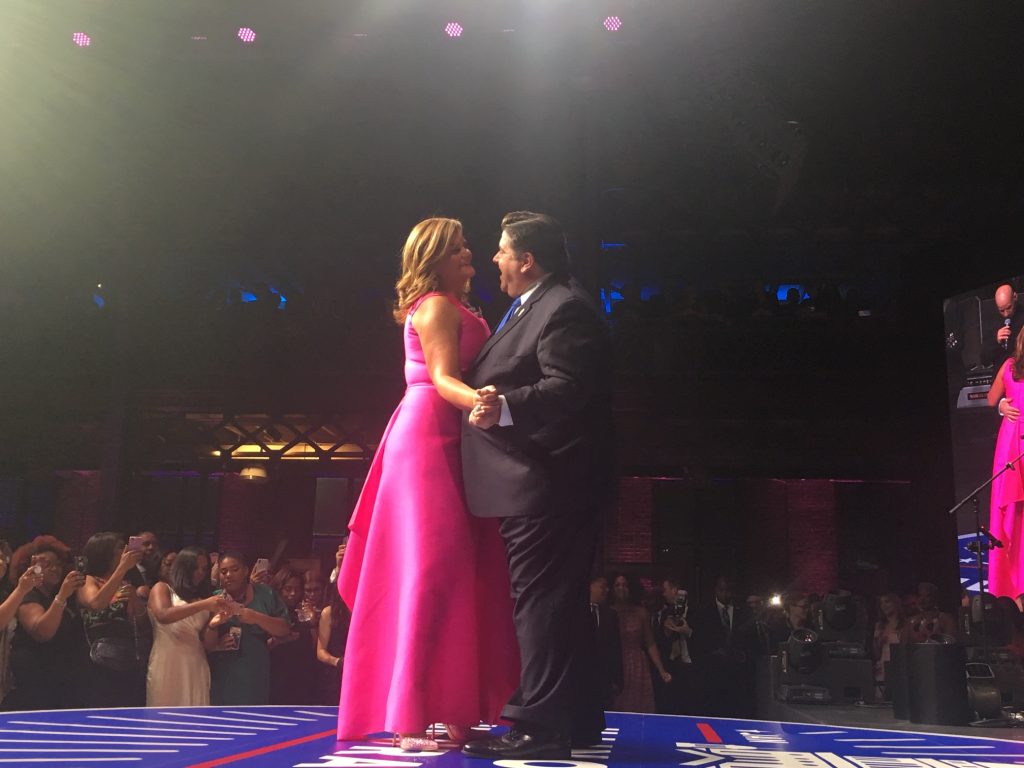 MK and JB Pritzker celebrate his election as governor. [Hannah Meisel/The Daily Line]
MK and JB Pritzker celebrate his election as governor. [Hannah Meisel/The Daily Line] -
As of 12:01 p.m. on Monday, Republicans no longer had control over any branch of Illinois state government.
Gov. JB Pritzker laid out a bold, progressive vision for Illinois in his acceptance speech, as did the other five Democrats who also took office Monday afternoon, leaving Republicans with two choices: to saddle up to the negotiating table or fight from the outside.After four years under Gov. Bruce Rauner, many Republicans admit that the constant fighting the self-styled outsider engaged in was ultimately unproductive and led to him losing the office to Pritzker by a near-historic margin in November. So for now at least, most Illinois Republicans are picking the first option and pulling up a chair.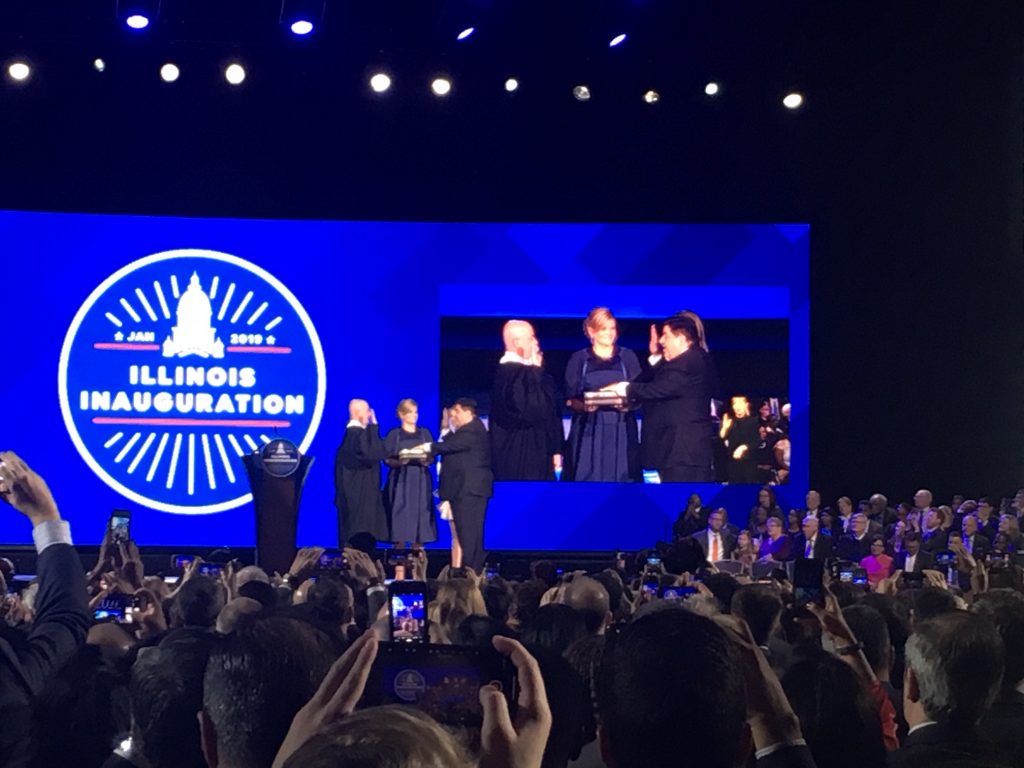 Gov. JB Pritzker takes the oath of office. [Hannah Meisel/The Daily Line]
Gov. JB Pritzker takes the oath of office. [Hannah Meisel/The Daily Line]
One of the cornerstones of Pritzker’s campaign was his promise to enact a progressive income tax, in which the wealthy — like Pritzker and Rauner — would pay more than those in the middle or working class. Instituting a graduated tax would require changing the state’s constitution, which has mandated a flat income tax for the last 50 years.
Pritzker’s inauguration address did not back off from that campaign promise, telling attendees that Illinois’ current tax structure is “simply unsustainable.”
“Others have lied to you about that fact,” he said. “I won’t. The future of Illinois depends on the passage of a fair income tax, which will bring us into the 21st Century like most of our midwestern neighbors, and like the vast majority of the United States.”
Pritzker said he is “not naïve” about what lies ahead in that fight, and gave a warning to those who oppose a graduated income tax, saying that those who wish to discuss and debate the change “in good faith will be welcomed to the table.”
“But if you lead with partisanship and scare tactics you will be met with considerable political will,” Pritzker said.
Speaking with reporters after the inauguration, Senate Minority Leader Bill Brady (R-Bloomington) said he “wasn’t offended by the rhetoric” from Pritzker’s speech about the coming fight over a progressive income tax.
“What I’ve told him very clearly is that’s not a partisan divide, it’s a philosophical issue,” Brady said. “We Republicans believe that reducing the burden on families and business is more productive, more conducive to economic growth. He believes, obviously strongly, the way he does. But he’s been very clear that aside from that issue, there’s many issues we can work together on and I think he frankly would like to see some Republican ideas as he begins his administration.”
One of those issues, Brady said, is the need for a comprehensive capital bill — one that not only plans ahead for infrastructure needs, but also provides a stable source of revenues to keep the plan on track.
In his address, Pritzker highlighted the need for a new infrastructure plan.
“Railways, roads, bridges and fresh water arteries are on the verge of collapse,” Pritzker said. “Crumbling bridges mean people’s lives are in danger. Deteriorating rail systems mean goods and services take longer to deliver and cost more. We are the nation’s supply chain hub and we must be built like it.”
Illinois’ last capital bill was passed in 2009, and advocates have been pushing for a new plan for years.
One of those advocates, who is both a former colleague and gubernatorial opponent of Brady’s, is Regional Transit Authority Chairman Kirk Dillard, who served in the Illinois Senate for 20 years, representing Hinsdale and surrounding areas. Dillard told The Daily Line on Wednesday that he’s met with Pritzker several times, and is encouraged that the Democrat is “upbeat and he listens.”
Dillard warned that Illinois’ infrastructure is “crumbling” at the same time as Illinois’ financial state. He said he’d “leave it up to policymakers” to which revenue streams would be best to pay off bonds for an infrastructure program, but spoke at length about one option that’s received the most attention lately: an increase in the state’s motor fuel tax.
“The gasoline tax in Illinois has not been touched in nearly four decades, and obviously construction costs have risen over those four decades,” Dillard said. “Its buying power is about half of what it was when it was passed when Jim Thompson was the governor. All the other states around us, except Missouri, have recently raised gasoline fees to pay for infrastructure. The costs for not doing anything in terms of maintenance repairs for automobiles often exceeds the actual costs of the gas tax fee itself.”
An agreement this year about a massive capital bill could help both parties establish some good will early on in Pritzker’s term, which could ease the sting for Republicans as Pritzker moves onto more progressive agenda items.
The governor will also have to contend with House and Senate bodies that are more ideologically divided than in recent years’ past, what with an energized left wing of the Democratic Party and a staunch conservative streak sweeping the Illinois GOP. Last week also saw the departure of a number of suburban Republicans, who were replaced by Democrats for the first time in many years — or in the state's history.
Dillard, himself a suburban Republican, told The Daily Line that it’s “very painful” to see that shrinking number of GOP suburbanites representing the state.
“The state functions best when it has a very diverse, bipartisan mix of legislators and that Senate Republican voice, of which I used to be part of, I think was a critical balance to Chicago, as well as downstate.,” Dillard said. “I would encourage the Republican party to put more of a focus on trying to re-elect some of the suburban Republican legislators.”
The Illinois GOP is in the midst of figuring out what its identity should be in the age of Pritzker, but despite Monday’s kumbaya-style rhetoric from some Republicans present at the inauguration, the tone from party Chairman Tim Schneider was decidedly different.
Rauner picked Schneider to lead the party 2014 and was a suburban Republican casualty of November's "Blue Wave," losing his seat on the Cook County Board of Commissioners.
Schneider has also faced major criticism from hardline conservatives during the past year when former State Rep. Jeanne Ives (R-Wheaton) and former State Sen. Sam McCann (C-Plainview) went rogue in their separate gubernatorial challenges to Rauner.
“It’s clear that Governor Pritzker’s agenda will be the same agenda that has dragged our state down for decades — borrow, tax, spend, repeat,” Schneider said in a statement. “Over the course of the election and again today, Pritzker promised billions of dollars in new spending, programs, and regulations, all of which our state cannot afford.”
Schneider also alleged that Pritzker’s support of independent redistricting maps in Illinois during the campaign “were only a ploy to win votes,” noting that the governor did not include that issue in his inaugural address.
“Pritzker never intended to end the status quo in Springfield,” Schneider said. “Rather, he’s reinforcing it.”
In a separate letter to Republicans Monday, Schneider struck an even more hardline tone, telling the party faithful that Pritzker’s swearing in “begins the reign of the tax-hiking, tax-avoiding billionaire, Madigan’s hand-picked hand-maiden for the government unions and the special interests feeding on our tax dollars.”
Party leaders will begin recruiting candidates for the 2020 cycle in the next several months. -
In some of his last acts as in his office, Gov. Bruce Rauner on Friday issued vetoes and amendatory vetoes on six bills, rendering them all dead.
-
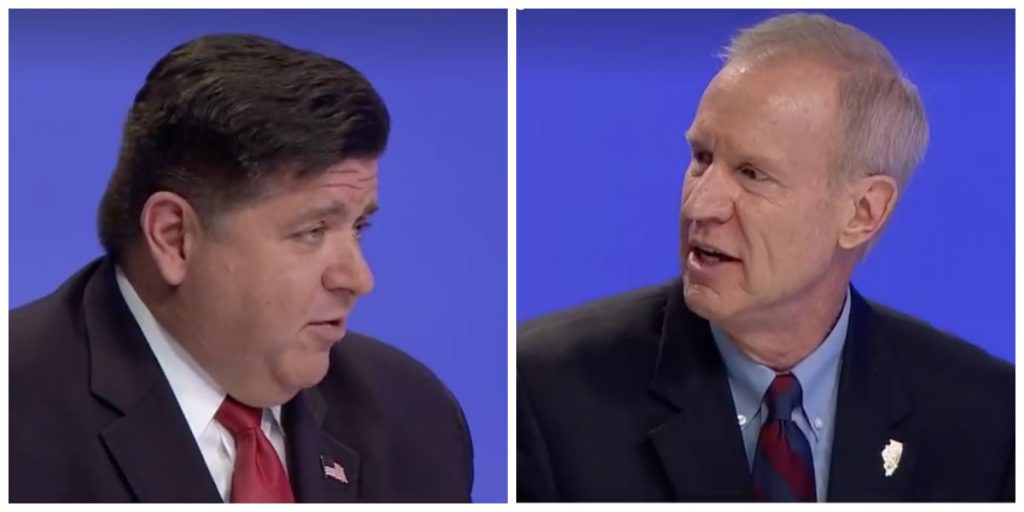 Democrat JB Pritzker and Gov. Bruce Rauner face off in a Sun-Times editorial board debate on Oct. 9, 2018.
Democrat JB Pritzker and Gov. Bruce Rauner face off in a Sun-Times editorial board debate on Oct. 9, 2018.
Gov. Bruce Rauner on Friday made two last-minute appointments on his way out the door, in an apparent contradiction of what he promised last month when he described such an action as “not proper policy.” Meanwhile, though Gov-elect JB Pritzker’s plans to boost his top employees’ salaries with money out of his own pocket may raise eyebrows, the Illinois Constitution doesn’t seem to mind. -
Gov.-elect JB Pritzker’s Monday inauguration will mark the beginning of the end in two separate years-long battles with the state’s largest public employee union, AFSCME Council 31 — battles that have gone from the negotiating table to the Illinois Labor Relations Board, and eventually to court.
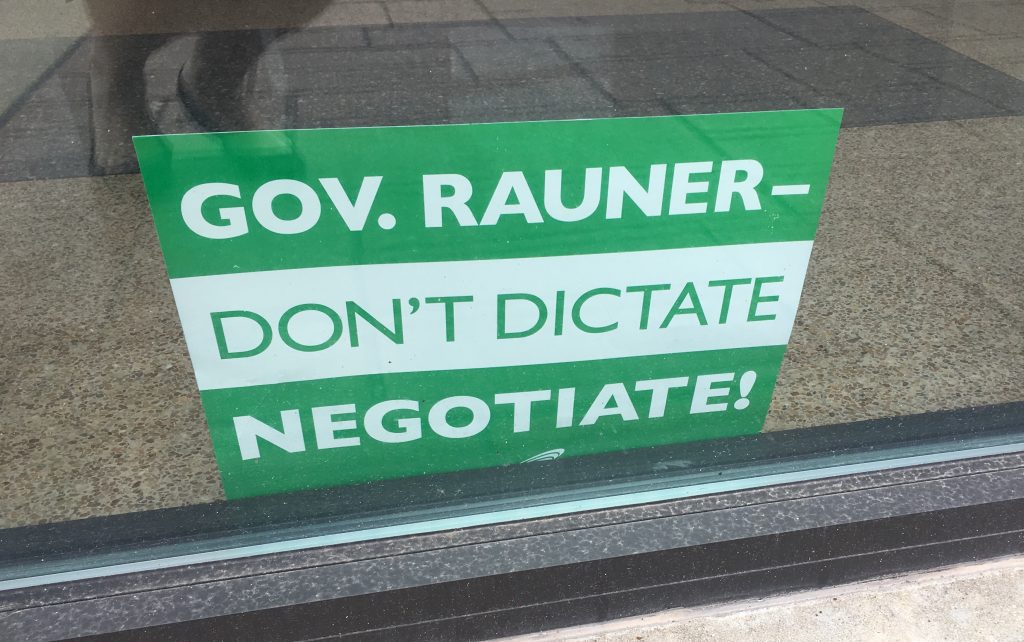 A sign urging Gov. Bruce Rauner to keep negotiating on a contract with AFSCME is displayed in the window of the union's Springfield office on February 23, 2017 — the same day the union authorized a strike, which never ended up happening.
A sign urging Gov. Bruce Rauner to keep negotiating on a contract with AFSCME is displayed in the window of the union's Springfield office on February 23, 2017 — the same day the union authorized a strike, which never ended up happening.
Do you like this page?











